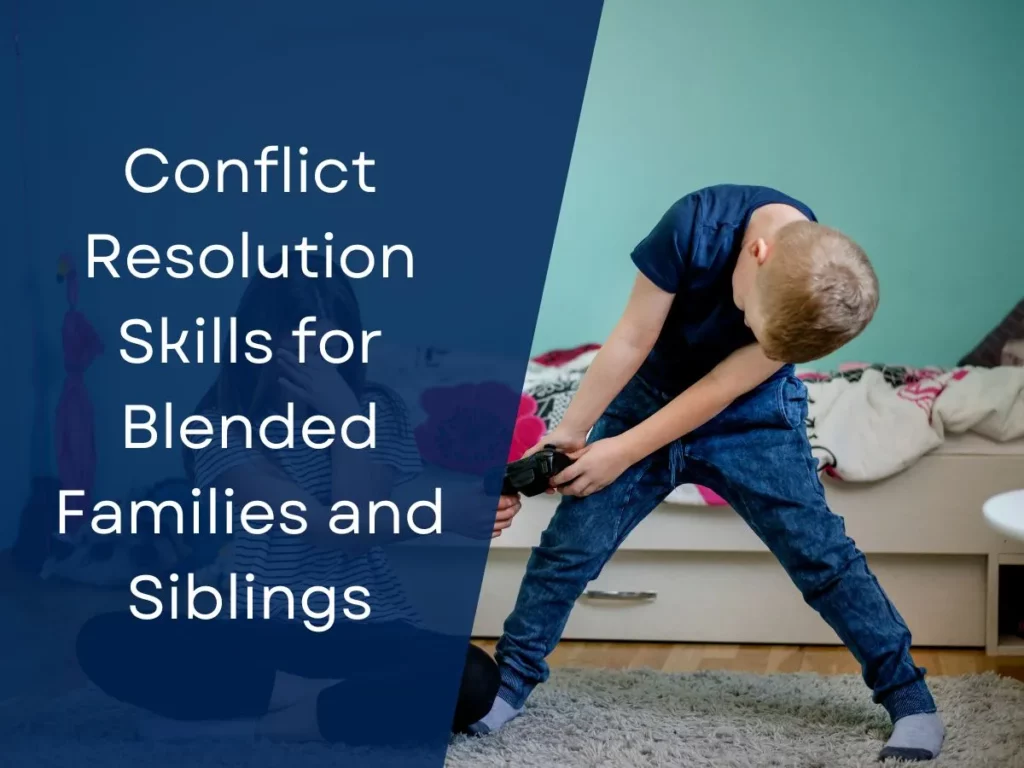Parents with several children know about the fights and arguments that occur among siblings.
Especially when there is a blended family – the fights are more frequent until they learn how to use conflict resolutions skills.
Stepsiblings clash because they are strangers defending their turf. They are not confident in the new relationships brought about by the developments in a mixed family. Children will be conflicted and want to preserve their normalcy, whereas others will simply try to adjust to the new normal.
Nevertheless, even many good-natured siblings will have their bouts of disagreements. But, families can minimize the instances of conflict among stepsiblings with the right strategies and tools.
Parents can instill unity among their kids with persistence. Teaching your child how to resolve conflicts from an early age will reduce all forms of conflict among siblings, stepsiblings, and even friends.
And when this happens, peace will reign in your household.

Why Do Siblings Argue and Fight?
There are a number of reasons why siblings argue and fight. But no matter what they are fighting about, it is usually because of an underlying reason.
- Preferential Treatment
- Personality Differences
- Unresolved Feelings
It can be about who gets to watch the TV or who gets to talk to their parent first. It can also be that the other sibling is being treated differently or shown more love.
In addition, personality differences can cause conflicts as well. Everyone is unique and behaves and reacts to things differently.
Below the surface, there can be unresolved emotions. If a sibling is being treated differently, then the other child can become jealous. If you put yourself in their shoes, you would have the same feelings as well. But as an adult, you go about it differently.
Children tend to argue and fight over these issues as a way to vent the frustration that they are feeling.
If your child sees you being more loving towards another sibling, that child will always have a problem with what they see, hear, and feel.
Conflict Resolution Skills Will Serve Them for the Rest of Their Lives
There are different ways to handle different types of conflict in a blended family. Regardless, parents must always create ways to have their children relate to each other in a healthy way.
Below are a few techniques on how to resolve conflicts in families. Do your research and gently help them learn how to utilize the conflict and communication skills that will serve them for a lifetime.
Teach Them Skills They Can Use
You must actively be a part of the solution. Make certain each child knows that their opinion is valid. Demonstrate to them how to resolve conflict in a positive manner.
They can do this by speaking calmly rather than shouting at each other or giving the other person a chance to voice their opinion.
Also, teach them how to compromise – how to give and take.
It is imperative that they learn how to be the bigger person in the situation and not allow someone else’s action to dictate how they react. If they are angry and feel reactive – let them know that they can separate themselves from the situation and choose to discuss it when they are calm.
These are skills that they will take with them through adulthood.
Because they are living in a small, confined space for many years, learning conflict resolution skills will significantly decrease any arguments and fights in the future.
Prevent Verbal Abuse or Physical Abuse
Don’t allow bullying in any shape or form.
Never allow fights to get out of control. Try to intercede as quickly as you can. Only after siblings start demonstrating responsible conflict resolution skills should they be allowed to take care of the issue among themselves.
Some kids will tend to have their fights and arguments when adults are not around. If this is the case, sit them down and listen to each side impartially. Ask questions to prod them into thinking about the matter and whether they handled the situation correctly.
If they still do not show that they are learning the skills, try teaching them in a different way.
Be the Adult and Mediate Escalating Conflicts
Some parents do nothing when they see their kids fighting. They believe that “kids will always be kids.” But not intervening might cause the situation to get out of hand. That would not be good for anyone.
Children have their own internal conflicts and might be feeling bad about the changes in the family and how little control they have. If one child is always winning the argument, the other can feel marginalized and suffer from low self-esteem. Remember to protect your children’s wellbeing.
Encourage Unity Among Your Children
Divorce is difficult, living with a new family can be even more so. You want to take time with your children and help them to adjust to their new way of life. Show them how to be happy for each other and be an example of this around your family.
It is not easy for blended families to consider themselves one unit, so teach your kids the importance of being a team and having each other’s backs. Talk to them about how their arguments negatively affect the entire family.
Conflicts are a part of life, but constant fighting should not be. Teach your children conflict resolution skills so that they can begin to bond and live in unity.
